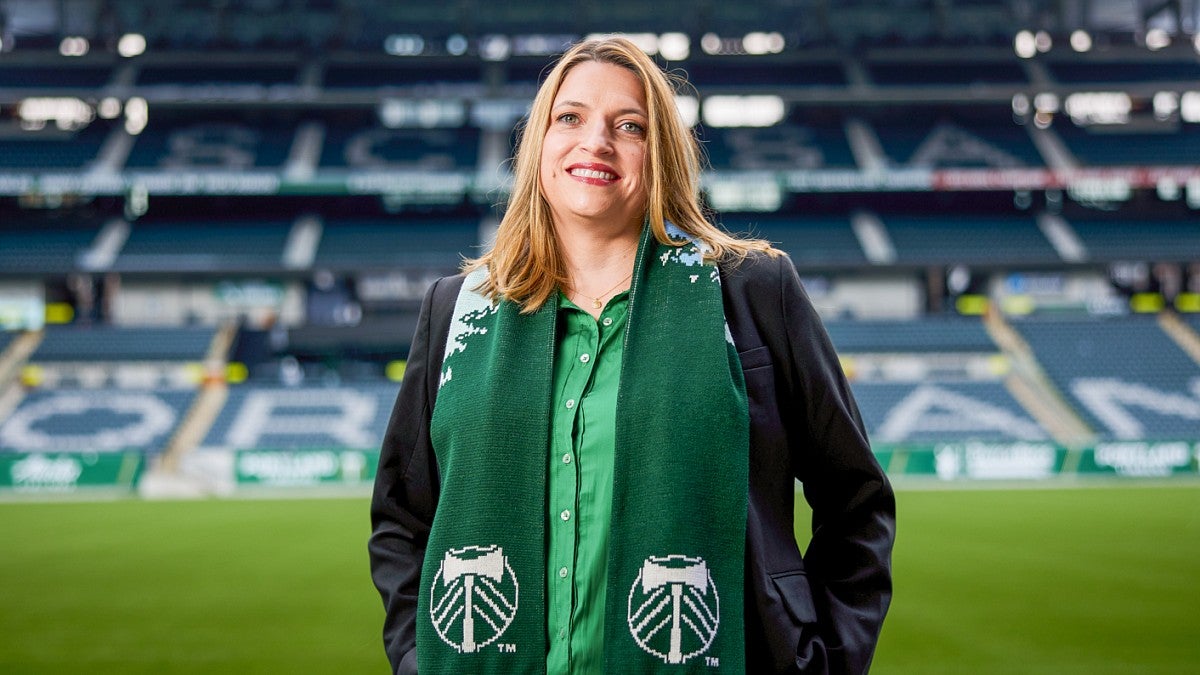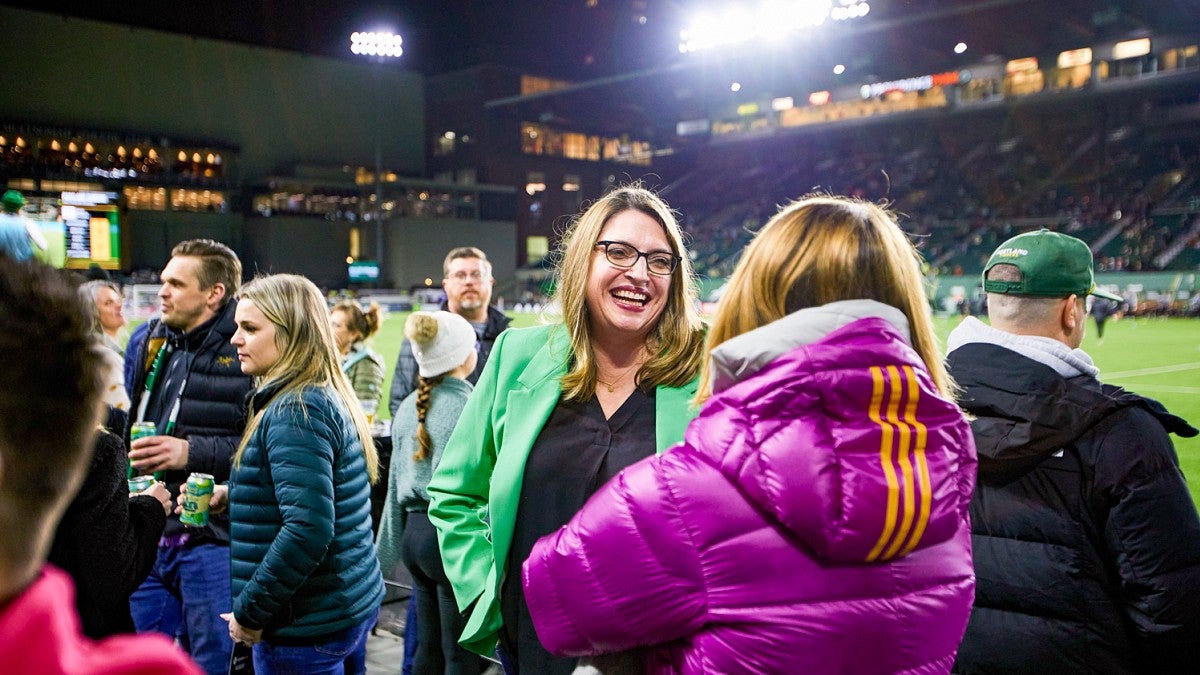Heather Davis went from the J-School to the White House to the NFL. Then she found a home as CEO of the Portland Timbers.

by Sophie Fowler, class of ’26
When Heather Davis graduated from the UO School of Journalism and Communication (SOJC) in 1998, she never thought she would be working as the CEO of the Portland Timbers Major League Soccer team 25 years later.
She started on a very different path, one that took her to the White House to work with some of the most influential figures of our time. Davis, a native Oregonian, followed in her father’s footsteps and majored in journalism at the UO. But unlike her father, she knew from the start that she did not want to be a journalist, so she double majored in political science.
“I graduated from the J-school knowing that I wasn’t going to go into traditional journalism,” Davis said. “I really wanted to be a speechwriter. That was what I was hoping to do.”
During her junior year of college, she participated in the National Student Exchange program and spent a year at the University of Maryland. The following summer, she got an internship at the White House. When she returned to UO for her senior year, she was determined to get back to D.C. Using skills she learned with her degree from the SOJC, Davis felt prepared for the competitive environment of D.C. politics.
“The education I received at the SOJC gave me critical communication skills that I have used at every stage of my career,” Davis said. “Written and verbal communication is the backbone of everything I have done professionally — from briefing the president in the Oval Office to writing persuasive memos as a lawyer to being a public spokesperson for the Timbers. The skills I learned at the SOJC have served me every step of the way.”
A quick rise to the White House
Straight out of college, Davis landed a prestigious job at the White House as a special assistant to President Bill Clinton. When his second term ended in 2001, she began working for Sen. Hillary Clinton until 2002.
Davis worked under Director of Scheduling Stephanie Street, a D.C. veteran who helped Bill Clinton on his presidential campaigns. Street taught Davis skills that she would use throughout her career, Davis said.
“I think that experience taught me the importance of preparation, doing your work, understanding substantively what you’re presenting and what you’re supposed to be doing,” Davis said. “It also taught me the ability to have or project confidence because you don’t always have it, but you need to sometimes project it.”
That ability to project confidence was essential at the White House, where she found herself talking to U.S. ambassadors and foreign diplomats and even briefing the president.
Likewise, working with Sen. Clinton during her first year in the Senate gave Davis a glimpse into the life of a powerful leader.
“Watching how Sen. Clinton was able to do the work and be confident in what she was doing — and that she felt like she was doing the best for her constituents and was able to drown out the noise and the naysayers” has stuck with her all these years, Davis said. “Tapping into what I saw her do has been really helpful.”

From the Oval Office to law school
In 2005, Davis was ready for a change. “It’s tough when you start at the White House, and you have to figure out how to move up from there,” she said.
She decided law school would be her next step. She enrolled in George Washington University with the intention of working in policy or on a Congressional committee eventually, but first she was determined to work at a law firm.
“I wanted to practice at least for a little while out of law school,” Davis said. “I knew a lot of people in D.C. who had not done that, so I wanted to make sure that I got a few years of practice in.”
The first firm she worked at was Covington and Burling in D.C. and New York. She moved over to Paul Hastings in 2010, where she handled international and special event operations.
At Paul Hastings, she specialized in sports law and represented high-profile clients like the NFL and the NHL. Davis discovered she was passionate about the quick pace and strategic thinking that sports law required.
She also realized that what she loved about sports law was the same thing she loved about being in politics.
“I’ve always loved sports,” Davis said. “But I think it was the connection to what it felt like being in politics that kept me coming back.”
After working at Paul Hastings for two years, Davis moved to the NFL, where she worked for nine years as a senior counsel.
Oregon lured her home
Davis enjoyed the work, but after 23 years on the East Coast, she longed for Oregon. After the pandemic hit, she and her husband decided to take a leap of faith and move back home to Portland in 2021. After working remotely for Vacasa, a friend who worked for Major League Soccer told her about an opening at the Portland Timber’s club, and Davis applied.
“I’m a fourth-generation Oregonian,” Davis said. “I love this state. It’s always been home, and I’ve always wanted to come back and make a difference.”
It was fitting that she landed with the Portland Timbers, a club beloved by Oregonians.
“It felt like it would be a fun full-circle moment,” Davis said. “It’s not often you get to come and work for a club with that kind of history, especially in soccer and the U.S.”
Davis loves her job at Timbers for many reasons, but one of the biggest is the community that brings people together through soccer.
“Those nights when everyone comes here and cheers on their team and is just excited to be here is what makes it special,” Davis said.
Every day on the job looks a little bit different, Davis said. She has a range of tasks on her plate from day to day.
“I have a really talented team around me,” she said. “Some days I get to sit back and go to lunch with someone and have a relaxing, normal workday, and send some emails. Other days, it’s just like ‘Whoa, everyone’s hair is on fire. What are we going to do next?’”

Taking it back to UO
Davis said she is forever grateful for UO and everything she learned at the SOJC.
“The journalism degree is such an important degree,” Davis said, because it taught her to write concisely and with precision.
“Writing is the most important tool and skill I have,” she said. “I think it is one of the most important skills you can have, from writing emails and letters to asking for jobs or networking opportunities. It comes in handy.”
Another important skill she learned was how to be a critical thinker when consuming media and information. “I think there is not a more important skill as a citizen of the world today,” she said. “Understanding the motivations and ethics behind journalism makes me better equipped to evaluate sources and information.”
Looking back on her career, Davis is grateful for the women who have helped pave the way, at the SOJC, at the White House and working in sports. Her best advice for young women interested in male-dominated fields is to believe in themselves.
“We just have to believe in ourselves and believe we’re the best people for the job,” Davis said. “And if you want to do it, find a way to convince someone that you’re the best person for the job.”
Her other advice for women is to give back.
“We have to support each other,” Davis said. “We have to have women who’ve made it willing to turn around and help other women climb that same ladder. That’s been a big part of the puzzle for my success. And now I want to do that for other women.”
Sophie Fowler, class of ’26, is a third-year journalism major with a minor in multimedia. She is a member of Duck TV and the Clark Honors College. She is also an intern with GoDucks Media and the SOJC Communications Office, and she has done work with TrackTown USA. You can connect with her on LinkedIn.
